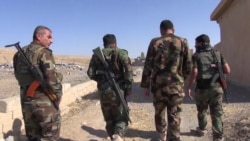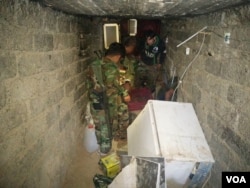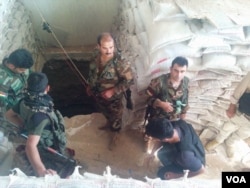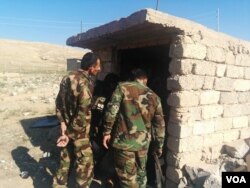About 10 kilometers from the front lines of the battle to retake Mosul, peshmerga soldiers tour an area recently recaptured from Islamic State militants. They say they've learned a lot about how the militant group works from examining the ruins of what were once bustling villages.
A bomb factory was installed in one shop and oil was burnt to hide the village from coalition forces, according to the soldiers.
Iraqi and Iraqi Kurdish peshmerga forces are exploring recaptured villages for insight into how Islamic State took and held these villages for more than two years.
"We don't exactly know how many IS members were here," said a peshmerga commander, Tahir Aziz. "But since the bodies of the dead remain here, we know how many were killed. We don't know how many escaped."
On one end of the village, sandbags fill most of a mosque because IS militants put them inside rather than outside — a ploy to hide IS positions from coalition planes. Peshmerga slip down the tunnel IS built under the village, examining the militants' escape route from their enemies.
While this kind of knowledge helps, soldiers say, fighting IS remains incredibly complicated.
"The challenges that remain are the car bombs and suicide bombs," said Lt. Col. Osman Ali of the peshmerga. "Also, we have weapons, but we are not as well equipped as the Iraqi Army. We need more and better weapons."
At the other end of the tunnel, soldiers emerge. They say they will keep fighting until the militant group is crushed.
Peshmerga soldiers, the Iraqi Army and Shiite militias are all fighting IS together, but tensions remain among them.
Even as these forces clear more areas of IS fighters, many people are frustrated because they still cannot go home, as rubble, bombs and bodies make the villages unsafe.
"We don't want to live outside of our homes," said Raad Ibrahim, a 35-year old father of one, as he waits outside a checkpoint Saturday, trying to get permission to visit his home. "I don't know anything about what is there. But I'm sure it's destroyed."


















